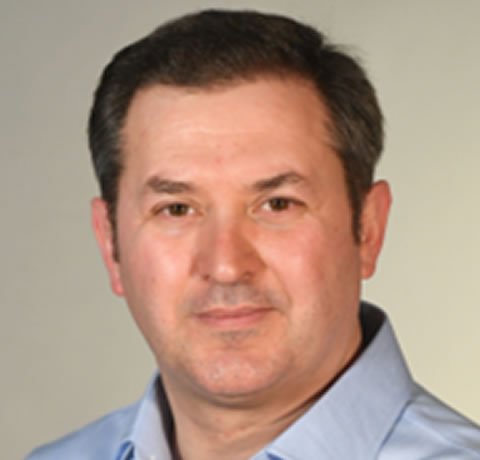Ivaylo Ivanov, PhD
Focus
Commensal microbes have profound influence on human health, including metabolism, behavior, tumorigenesis, and immunity. The Ivanov laboratory studies the immune mechanisms involved in recognition of commensal microbes and how these mechanisms participate in immune homeostasis (health) or immune pathology (disease). The overarching research directions of the lab are to study: 1) the cellular and molecular mechanisms by which resident commensal microbes engage and regulate host immunity; 2) the cellular networks that control immune responses in intestinal tissues; and 3) the role of microbiota and mucosal immunity in intestinal and systemic disease. Specific areas of research include functional characterization of microbiota-regulated tissue-immunity in IBD, mucosal infections, systemic metabolic disease, obesity and type 2 diabetes.
MIST Research
Mucosa are sites of conventional immune system attack for defense against invasive pathogens. Mucosa were also once regarded simply as inert barriers preventing commensal microbes from accessing sterile tissues. Instead, emerging evidence suggests a complex interplay between commensal microbes, barrier epithelial cells, and the immune system that is essential for local and systemic homeostasis of the host. We have recently provided insight into how recognition of commensal components by epithelial and innate immune cells triggers a specific immune reaction and why the nature of this reaction could foster host-microbe symbiosis instead of outright microbial rejection. Specifically, we showed that antigen acquisition be intestinal epithelial cells (IECs) of commensal antigens drives a non-pathogenic commensal Th17 cell response. Here we propose to mechanistically examine the fate of intracellular IEC antigens and the role of IECs in the process, as well as the phenotype and function of the generated Th17 cells. We will address these mechanism by pursuing two specific aims to explore 1) Role of IECs in priming of commensal T cell responses and 2) Generation and function of anti-inflammatory commensal Th17 cells. Our studies address fundamental mechanisms of mucosal immunity to commensal microbes and if successful will provide novel mechanisms of IEC function, as well as pathways for generation of protective mucosal T cell responses.
Current Grant Support
Research in the Ivanov Laboratory is supported by the National Institutes of Health (R01DK098378 (NIDDK), R01 AI144808 (NIAID), U01 AI163069 (NIAID), R21 AI146817 (NIAID)), an Investigators in the Pathogenesis of Infectious Disease Award from the Burroughs Wellcome Fund, and a Pew Innovator Award from the Pew Charitable Trust.
Publications
Ivaylo Ivanov, Ph.D.
Araujo LP, Edwards M, Irie K, Huang Y, Kawano Y, Tran A, De Michele S, Bhagat G, Wang HH, Ivanov II. Context-dependent role of group 3 innate lymphoid cells in mucosal protection. Science Immunology 2024, vol 9, In Press.
Brockmann L, Tran A, Huang Y, Edwards M, Ronda C, Wang HH, Ivanov II. Intestinal microbiota-specific Th17 cells possess regulatory properties and suppress effector T cells via c-MAF and IL-10. Immunity 2023, Dec 12;56(12):2719-2735.e7. PMID:38039966
Kawano Y, Edwards M, Huang Y, Bilate AM, Araujo LP, Tanoue T, Atarashi K, Ladinsky MS, Reiner SL, Wang HH, Mucida D, Honda K, Ivanov II. Dietary sugar-induced microbiota imbalance disrupts immune-mediated protection from metabolic syndrome. Cell 2022 Sep 15;185(19):3501-3519.e20. PMID: 36041436.
Ivanov II, Tuganbaev T, Skelly AN, Honda K. T cell responses to the microbiota. Annual Review of Immunology. 2022 Feb 3. PMID: 35113732
Zhang X, Bandyopadhyay S, Araujo LP, Tong K, Flores J, Laubitz D, Zhao Y, Yap G, Wang J, Zou Q, Ferraris R, Zhang L, Hu W, Bonder EM, Kiela PR, Coffey R, Verzi MP, Ivanov II, Gao N. Elevating EGFR-MAPK program by a nonconventional Cdc42 enhances intestinal epithelial survival and regeneration. JCI Insight. 2020 Aug 20;5(16):135923. PMID 32686657
Ladinsky MS, Araujo LP, Zhang X, Veltri J, Galan-Diez M, Soualhi S, Lee C, Irie K, Pinker E, Narushima S, Bandyopadhyay S, Nagayama M, Elhenawy W, Coombes BK, Ferraris RP, Honda K, Iliev ID, Gao N, Bjorkman PJ, Ivanov II. Endocytosis of commensal antigens by intestinal epithelial cells regulates mucosal T cell homeostasis. Science 2019 Mar 9;363(6431). PMID 30846568

 Ivaylo Ivanov, PhD
Ivaylo Ivanov, PhD